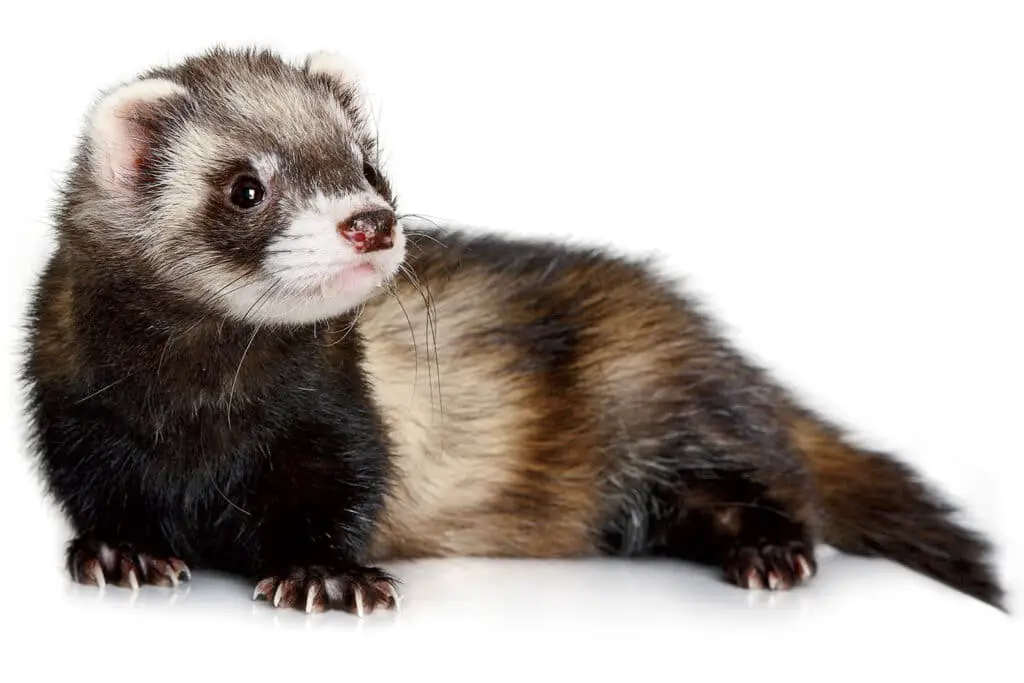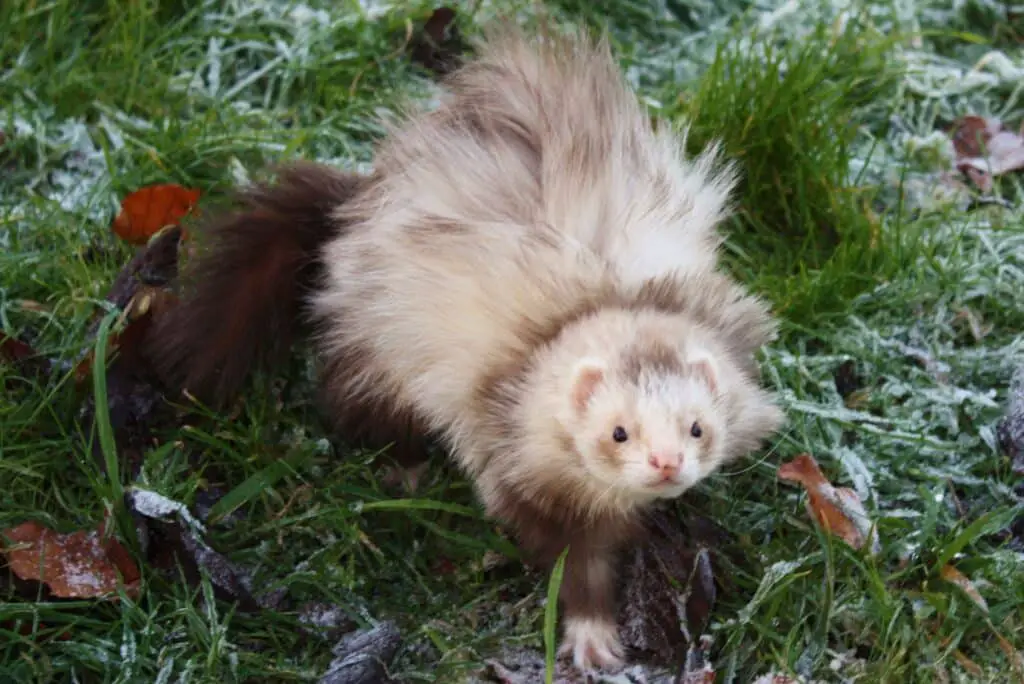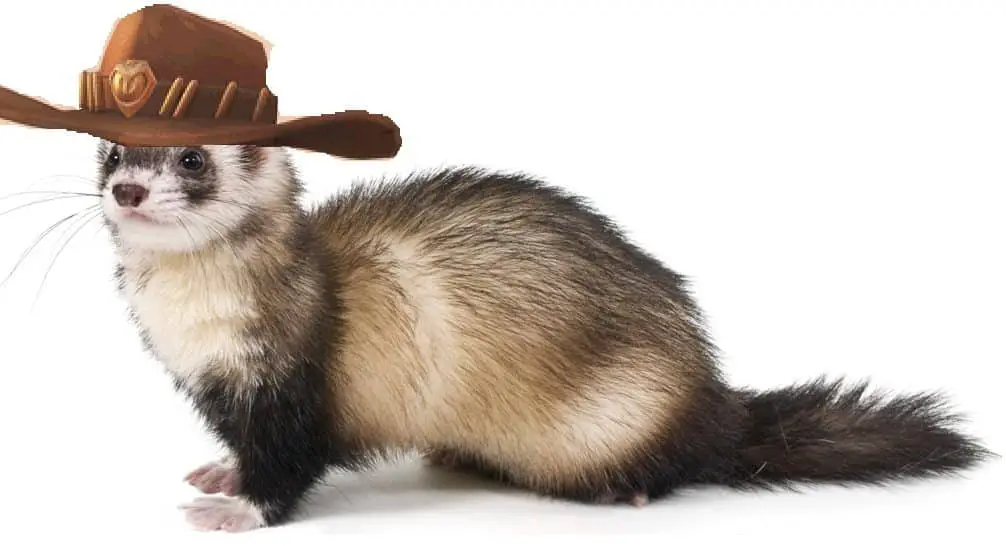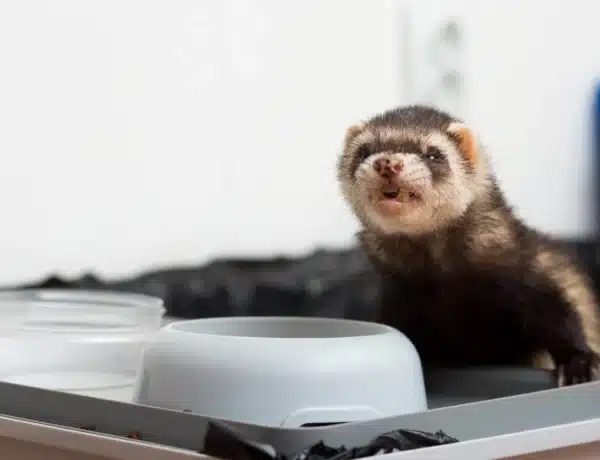Introduction
Are Ferrets High Maintenance: Ferrets, those playful and inquisitive little creatures, have captured the hearts of many as unique and endearing pets. However, as any potential ferret owner soon discovers, these charming animals come with their own set of demands and requirements. To answer this query, we must delve into the world of ferret care, exploring their needs, behaviors, and the level of commitment required to provide them with a happy and healthy life. In this discussion, we will examine the various aspects of ferret ownership to shed light on whether these captivating critters truly deserve their reputation as high-maintenance pets. Before delving into the question of whether ferrets are high maintenance, it is crucial to understand the natural behaviors and instincts of these animals. Ferrets are domesticated members of the Mustelidae family, closely related to weasels, otters, and minks. In the wild, they are agile hunters and burrowers, which directly influences their behavior as pets. They are known for their boundless curiosity, energy, and love for exploration.
This innate curiosity often leads to mischief, and ferrets have a reputation for getting into tight spots and trouble around the house. Ferrets train are highly social animals that thrive on human interaction and the company of their own kind. This social nature means that they can become lonely and stressed if left alone for extended periods. Ferret owners must be prepared to dedicate time to play, cuddle, and engage with their furry companions. Neglecting their social needs can lead to behavioral issues and a less fulfilling relationship with your pet. Feeding ferrets can be a bit more demanding than providing standard pet food. Ferrets are obligate carnivores, meaning they require a diet primarily consisting of meat and animal-based proteins. Their digestive systems are specialized for this diet, making it essential to find high-quality ferret-specific food.
Ferrets are notorious escape artists and can slip through surprisingly small openings. Ferret-proofing your home is a must to prevent them from getting into dangerous situations. This involves securing cabinets, blocking off tight spaces, and providing a safe environment for your furry friends to explore. Litter training ferrets can be a challenging task, as they tend to have accidents and scatter litter around their living space. Cleaning up after ferrets is an ongoing commitment that requires patience and consistency. Ferrets have unique grooming needs, including regular bathing to keep their fur clean and odor-free. Maintaining their hygiene can be time-consuming and requires special ferret-safe shampoos and grooming tools. Beyond the time and effort required, ferrets can also be financially demanding.

Are ferrets hard to take care of?
“They’re more like dogs in a small package,” says Lamb. “They’re very high maintenance.” Because they’re agile escape artists, ferrets must be caged for safety when unsupervised. They need the largest cage possible, and they require plenty of time out of the cage, with social interaction.
To determine if ferrets are challenging to care for, it’s crucial to begin by understanding their natural behaviors. Ferrets are obligate carnivores, which means they require a diet primarily consisting of meat and animal-based proteins. Their curious and playful nature means they need mental stimulation, social interaction, and regular exercise. They’re known to be escape artists and can squeeze into small spaces, making ferret-proofing your home a necessity.
Ferrets are highly social animals that thrive on interaction with both their human caregivers and fellow ferrets. This sociable nature can be both a joy and a challenge. While it’s delightful to witness their playful antics and affectionate behavior, it also means they can become lonely and stressed when left alone for extended periods. Ferret owners should be prepared to dedicate time daily to play and bond with their furry friends.
Like all pets, ferrets require regular veterinary care, vaccinations, and preventive measures to keep them healthy. Veterinary expenses can add up, and potential health issues should be considered when evaluating the overall care requirements. Additionally, ferrets have specific health concerns, such as adrenal disease and insulinoma, that require vigilance and proactive management.
Maintaining a ferret’s hygiene can be somewhat challenging, as they need regular baths to keep their fur clean and odor-free. Their nails also require trimming, and their bedding and living space need frequent cleaning to prevent odors and the spread of disease.
The cost of ferret ownership goes beyond their basic needs. Ferret owners should be prepared for ongoing expenses, which include food, bedding, toys, grooming supplies, veterinary care, and emergency medical costs. The financial aspect of ferret care can be a significant consideration.
What is the downside of owning a ferret?
Ferrets may not be the right pet for everyone especially a family with young children because ferrets can bite. As with any interaction between kids and pets, close parental supervision is a must. Owners should avoid face-to-face contact with their ferret because they could bite.
Ferrets are renowned for their boundless energy. They are active creatures that require ample playtime and mental stimulation. For owners with a sedentary lifestyle or limited space, keeping up with a ferret’s need for activity can be challenging. Failure to provide enough physical and mental stimulation can lead to behavioral issues and a less enjoyable pet-owner relationship.
Ferrets are highly social animals, and they thrive on human interaction and the company of other ferrets. While their affectionate nature is endearing, it can also be demanding. Owners need to dedicate time daily to engage with their ferrets, and those who leave their ferrets alone for extended periods may find their pets become lonely, stressed, or prone to depression.
Ferrets are obligate carnivores with specific dietary needs. Their diet must consist primarily of meat and animal-based proteins. Finding high-quality ferret-specific food can be a challenge in some areas, and providing the proper nutrition can be more costly than for some other pets.
Ferrets are prone to certain health issues, including adrenal disease, insulinoma, and dental problems. Regular veterinary care is essential to monitor their health and address any medical concerns promptly. This can result in significant veterinary expenses over their lifetime.
Ferrets have unique grooming needs. They require regular baths to keep their fur clean and odor-free. Additionally, their nails need trimming, and their living space, including bedding and litter boxes, requires frequent cleaning to prevent unpleasant odors and the spread of disease.
Do ferrets take a lot of care?
But they require a lot of care and commitment for their entire lifespans, which can be anywhere from 7-9 or even 10 years, so before you take one home, you want to make sure you’re up for taking care of a pet ferret.
To gauge the care needs of ferrets, it’s essential to begin with an understanding of their natural behaviors. Ferrets are obligate carnivores, which means they require a diet primarily consisting of meat and animal-based proteins. Their curious and playful nature means they need mental stimulation, social interaction, and regular exercise. They are known for being escape artists and can squeeze into small spaces, requiring owners to ferret-proof their homes.
Ferrets are highly social animals, and their need for interaction with both humans and fellow ferrets is a defining aspect of their care. While this social nature makes them endearing companions, it also means they can become lonely and stressed when left alone for extended periods. Owners must commit to daily playtime, cuddles, and bonding with their ferrets to ensure their well-being.
Meeting the dietary needs of ferrets can be somewhat demanding. They have specific nutritional requirements that necessitate high-quality ferret-specific food. Ferrets have a rapid metabolism, which means they need frequent meals, and their sensitive digestive systems require careful attention to prevent health issues.
Like all pets, ferrets require routine veterinary care, vaccinations, and preventive measures to maintain their health. Veterinary expenses can add up, and prospective owners should be prepared for the financial commitment. Additionally, ferrets are prone to specific health concerns, such as adrenal disease and insulinoma, which require vigilant monitoring and management.
Ferret hygiene can be somewhat challenging to maintain. They need regular baths to keep their fur clean and odor-free, their nails require trimming, and their living space needs frequent cleaning to prevent odors and the spread of disease.
Are ferrets easier than dogs?
You’re not going to be able to train a ferret as easily as you can train a dog or a cat. A ferret won’t tell you that it has to “go” like a dog will, and he won’t take naturally to a litter box like a cat will. Litter training a ferret takes work. Lots of work.
Both ferrets and dogs are social animals, but the nature of their social needs differs. Ferrets are highly social with their human caregivers and other ferrets, requiring daily interaction and playtime. They can become lonely and stressed if left alone for long periods.
Dogs, too, are social animals and often form strong bonds with their human owners. They usually require more consistent attention and companionship from their owners, including walks, training, and playtime.
Dogs generally require more training and obedience work than ferrets. Dogs can be taught commands, house training, and other behaviors, which can take time and patience. Ferrets can be litter trained and taught basic commands, but their training tends to be less extensive and complex than that of dogs.
Ferrets require regular grooming to maintain their hygiene, including baths to keep their fur clean and odor-free. Their nails also need trimming. Dogs have varying grooming needs depending on their breed, but some breeds require regular brushing, bathing, and grooming, which can be more time-consuming.
Ferrets have a shorter lifespan compared to dogs. Ferrets typically live for around 6 to 10 years, while dogs can live anywhere from 10 to 15 years or longer. The shorter lifespan of ferrets may result in more frequent pet loss, which can be emotionally challenging for owners.
Do ferret bites hurt?
It’s worth noting that the ferret’s skin is thicker and tougher than human skin, so when ferrets nip at each other in play, they don’t inflict any real pain. But when they nip at a human, it can hurt.
Ferrets are naturally curious animals, and they explore their surroundings primarily with their mouths. They use their sharp teeth to investigate objects and communicate with each other. This behavior is instinctual and not necessarily aggressive.
One common type of ferret bite is what’s known as “play biting.” When ferrets are engaged in play, they may gently nip or nibble on their human caregivers. This behavior is usually not intended to cause harm and is more akin to a form of interaction. Playful bites are typically not painful and are often more surprising than anything else.
However, ferrets can sometimes exhibit nipping behavior when they become overstimulated, frustrated, or frightened. Nipping can be a defensive response or a way for them to communicate discomfort. In these cases, ferret bites can be more intense and may cause mild discomfort or pain.
Proper training and socialization are essential to help minimize nipping and biting behavior in ferrets. Ferrets can be taught not to bite aggressively through consistent and gentle training methods. This includes redirecting their behavior with toys and providing positive reinforcement when they exhibit appropriate behavior.
What do ferrets smell like?
One of the things that people will notice if you have a ferret or if you’re ever encountered a ferret for the first time is that they do have a very distinctive odor. It’s described as a musky odor. If you’ve never smelled it before, it’s kind of hard to describe. It’s not the most pleasant-smelling odor.
Ferrets are known for their distinctive odor, and their scent is one of the defining characteristics of these playful and curious creatures. Understanding why ferrets have a particular smell and how to manage it is essential for prospective and current ferret owners.
Ferrets have natural scent glands located near their anus that produce a musky odor. These glands are part of their physiology and play a role in their communication with other ferrets. The scent produced by these glands can vary from one ferret to another and may change depending on factors such as age, diet, and health.
The diet of a ferret can significantly influence their odor. Ferrets are obligate carnivores, meaning their diet primarily consists of meat and animal-based proteins. The type of food they eat can affect the intensity of their scent. Lower-quality diets or diets high in plant-based ingredients can contribute to a stronger and less pleasant odor.
A ferret’s personal hygiene also plays a role in their scent. Ferrets are naturally clean animals and groom themselves regularly. However, if they are not provided with appropriate bedding, litter, or living conditions, their scent may become more pronounced.
Are ferrets cuddly?
Ferrets may be tiny, but they pack big personalities into small packages. These guys can be extremely loving and cuddly with their humans. Of course, it takes time to form that special friendship.
Ferrets are known for their affectionate and social nature. They form strong bonds with their human caregivers and often seek out companionship and physical affection. Many ferrets enjoy cuddling with their owners, and some can become quite attached, following their owners around the house and wanting to be near them as much as possible.
Ferrets thrive on social interaction, and cuddling can be one of the ways they express their desire for companionship. When a ferret cuddles with you, it often involves snuggling against your body, seeking warmth and comfort. They may also groom you, nibble gently, or nuzzle your hand as a sign of affection.
Ferrets are playful animals, and their cuddling sessions often involve playful antics. They may “wrestle” with your hand or fingers, hop around, and engage in other playful behaviors while cuddling. This combination of playfulness and affection can make cuddling with ferrets a unique and enjoyable experience.
Understanding a ferret’s body language is essential when cuddling with them. Ferrets may exhibit various signs of contentment while cuddling, such as a relaxed posture, purring, and gently licking or nibbling. It’s important to pay attention to their cues and respect their boundaries. If a ferret becomes agitated or restless, it’s best to give them space or engage in play to prevent them from becoming uncomfortable.
Do ferrets love owners?
While ferrets are not for everyone, they can make great pets for the right owner. They are affectionate and bond with their owners, quiet for a large part of the day, and there are few pets as playful as ferrets.
Ferrets are naturally social animals, both with their fellow ferrets and with humans. When they are properly socialized and cared for, ferrets can form strong bonds with their owners. This bonding often involves seeking out their owners’ company, following them around, and wanting to be part of their daily activities.
Ferrets have their unique ways of showing affection. They may nuzzle, groom, nibble gently, or even “dance” around their owners as signs of their fondness. Some ferrets enjoy cuddling and snuggling with their owners, seeking warmth and comfort in their presence.
Ferrets are playful creatures, and their interaction with their owners often includes playful antics. They may engage in games, play “hide and seek,” or pounce on their owners’ hands or feet in a playful manner. This playfulness is a form of bonding and can be seen as their way of expressing affection.
Ferrets can also experience separation anxiety when their owners are away for extended periods. This anxiety is a testament to the attachment they feel towards their human companions. Signs of separation anxiety in ferrets may include restlessness, pacing, and vocalization when left alone.

Conclusion
In the world of pet ownership, the question of whether ferrets are high maintenance has a nuanced answer. Ferrets are undeniably unique and captivating companions, but they come with a set of demands that can be more involved compared to some other pets. Understanding their natural behaviors, social needs, dietary requirements, and the importance of creating a safe environment is essential for a harmonious and rewarding relationship with these curious creatures. While ferrets do require a significant commitment of time, attention, and resources, the level of maintenance pets can vary depending on individual circumstances and preferences. Some may find the effort to be well worth the joy and companionship these playful critters bring, while others might consider it too demanding for their lifestyle. Ultimately, whether ferrets are high maintenance or not depends on your perspective and how prepared you are to meet their needs.
While some might perceive their care requirements as high maintenance due to the need for specialized diets, social interaction, and meticulous grooming, others may embrace these responsibilities as a labor of love. It’s important to remember that every pet, including ferrets, demands time, attention, and resources, and the decision to bring a ferret into your life should be based on a clear understanding of these responsibilities. For those who are prepared to invest the necessary effort and resources, ferrets can be incredibly rewarding companions. Their boundless energy, playful nature, and affectionate demeanor can bring immeasurable joy and laughter into your life.
In summary, ferret ownership can indeed be considered high maintenance, given the unique needs and demands these playful creatures present. The level of maintenance is influenced by factors such as their social nature, dietary requirements, need for a safe environment, grooming needs, and associated costs. However, it’s important to emphasize that while ferrets may require extra attention and effort, the rewards of having them as pets can be immeasurable. The bond you develop with your ferrets, the joy they bring into your life, and the memories you create together can make the maintenance aspect feel more like a labor of love than a burden. Like any pet, ferrets thrive when provided with proper care, attention, and a supportive, loving environment. Therefore, the question of whether ferrets are high maintenance ultimately comes down to your willingness and dedication to meeting their unique needs and enriching their lives as cherished members of your family.





No Comments